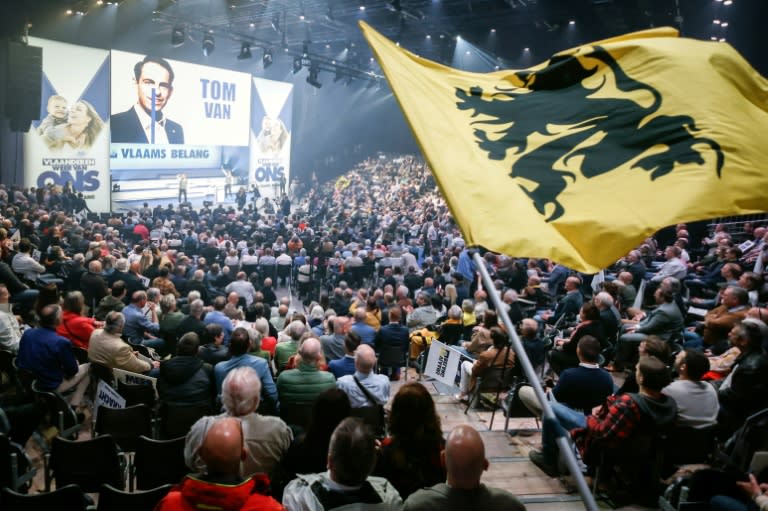Far right falls short of first place in Belgian vote

Belgium's biggest far-right party made gains, but fewer than projected, in national and regional elections held Sunday in parallel with an EU vote.
A near-total count of ballots showed far-right Flemish separatists Vlaams Belang trailing conservatives N-VA in the Dutch-speaking Flanders region, and in the national parliament.
"Our obituaries were written, but we won these elections," said N-VA leader Bart De Wever, who now looks a good bet to become Belgium's next prime minister.
The outgoing governing coalition headed by liberal Prime Minister Alexander De Croo lost its ability to form a majority as centrist and Green parties suffered.
"This is a particularly difficult evening for us, the signal from the voters has been clear," De Croo told supporters, wiping a tear from the corner of his eye.
Now, the linguistically divided country faces a protracted period of wrangling to form a new government -- after taking 493 days last time round to hash together a governing coalition in 2019.
Voters on Sunday were asked to choose Belgian lawmakers for the next EU parliament as well as for the country's regional legislatures in Flanders, Wallonia, Brussels and its small German-speaking community.
Despite picking up some 22 percent of the vote for the Flemish parliament and 14 percent for the federal parliament, Vlaams Belang looked set to remain excluded from power.
The anti-immigration eurosceptics had been hoping that a dominant showing would see them force their way into the regional government, just as ally Geert Wilders had done on the national stage in the Netherlands with a win last year.
Other parties in Flanders -- including N-VA -- have a long-standing agreement not to let the extreme right into government in the region.
On the national level, the hardline party pushing for Flanders to become an independent country is also snubbed by other parties.
- Let the wrangling begin... -
Key players in talks for the next government look likely to be the centre-right Reformists Movement (MR) and The Engaged group, which both saw a rise in their vote in French-speaking Wallonia.
MR displaced the dominant Socialist Party as the first party in the region, while an expected surge for the communist Workers' Party did not materialise.
Results showed that Belgium's Greens suffered losses which could exclude them from coalitions they were part of in the federal parliament, the capital Brussels and the country's French-speaking Wallonia region.
According to protocol, De Croo will hand in his resignation to Belgium's King Philippe on Monday at the royal palace in Brussels.
He is set to remain acting prime minister for months to come as talks drag on between Belgium's squabbling politicians to find a new government.
Split between its rival language camps, Belgium's complex political patchwork has long been seen as borderline dysfunctional.
Belgium's current unenviable record for time spent forming a coalition stands at the 541 days hit in 2010-2011.
mad/ec/jj

 Yahoo News
Yahoo News 